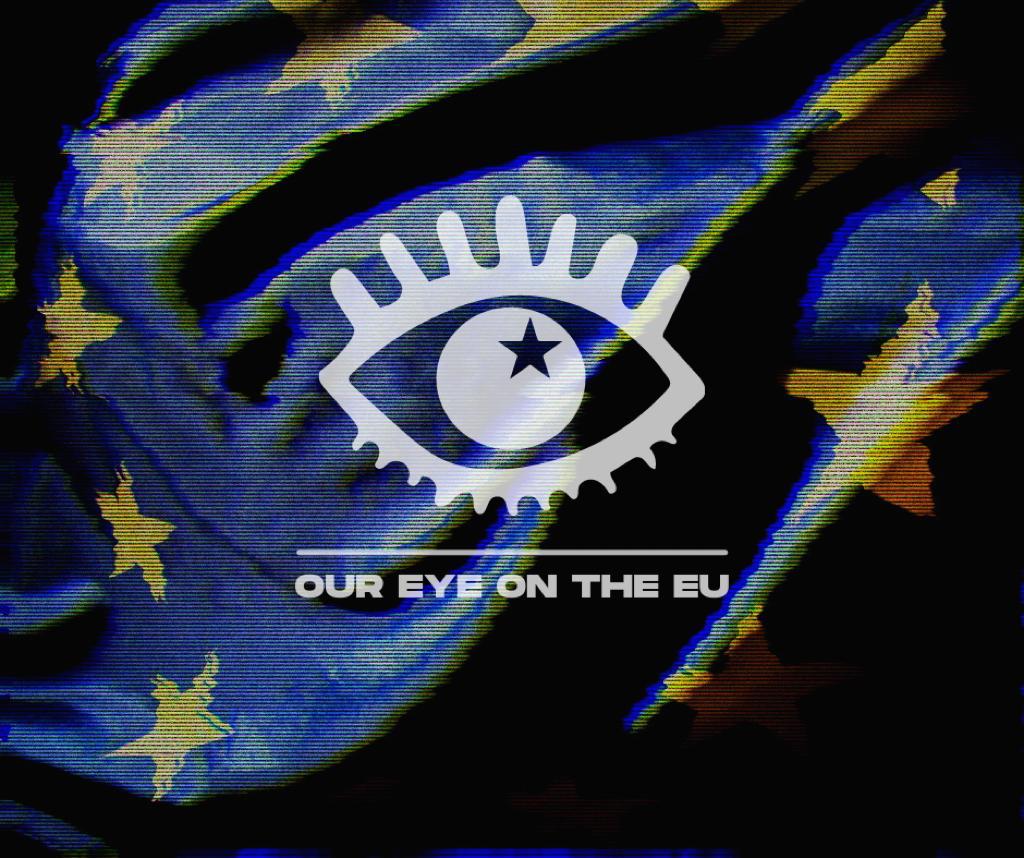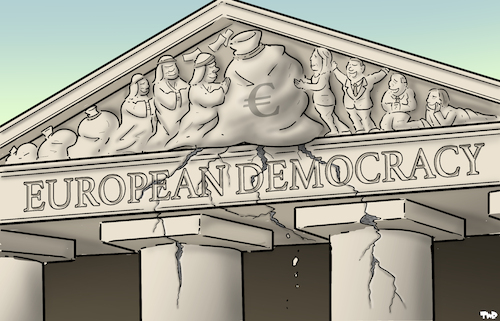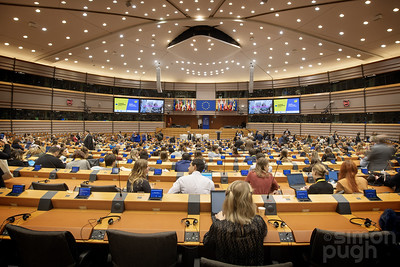
Democracy at stake: what happens when money takes it all (once again)

You may have heard about what happened over the last few days in the European Parliament. “Qatargate” has revealed a series of scandals involving MEPs, among which are the (now ex) Vice President Eva Kaili, and other key figures such as MEP assistants and representatives of human rights NGOs. Some have been accused of having accepted money from Qatar in exchange for influencing EU politics on key questions regarding the country.
Now, this scandal opens up many reflections:
- We need a strong transparency register for extra-EU lobbies within EU institutions: citizens have the right to know what kinds of activities go on, and who they involve.
- The way this scandal is being faced by EU institutions and political parties will determine how we get to the next EU elections, which leads to the next point.
- Credibility of EU institutions, and especially the EP – the only one that EU citizens elect and which represents their interests and rights – is key. It is said that if the Commission has the money, and the Council has the power, the Parliament has the people.
- Last, and also most painful point, is about EU citizens’ trust towards their institutions: it took ages to build it, and only a few moments for it to collapse.
Citizens’ Participation & EU elections
It is quite ironic that EU institutions have been working, throughout these very days, to reinforce democracy and strengthen electoral rights.
- On 13th December, the Council presented a set of proposals to introduce new rules and measures reinforcing democracy and the integrity of electoral processes in view of the 2024 EU elections.
- Voting abroad: the EP’s Committee for Constitutional Affairs voted on a series of proposals to strengthen EU citizens’ right to vote in the 2024 European elections when they reside in a different Member State. This goes hand in hand with the proposal that was presented earlier this year to modify EU electoral law and introduce transnational lists.
The question is, how can all this still make sense to EU citizens, when their trust towards those who should represent their voice in the EU has been undermined from its roots?
Enlargement & Neighbourhood

Despite substantiated reports on violations of EU and international human rights law by Croatian border guards, Croatia will officially be joining the Schengen Area as of 1st January 2023. Not a surprise considering that, over the past years, EU institutions have repeatedly overlooked overwhelming evidence of systematic human rights violations at the EU’s external borders, including in Croatia, and rewarded hardline tactics that have fortified borders and prevented people seeking protection from entering the EU at any cost.
And while Croatia has been given the green light, Romania and Bulgaria have not joined the Schengen Area yet due to their “softness on illegal migration”, as the Austrian and the Dutch Ministries of Interior stated during the Justice and Home Affairs Council meeting this month. To us, however, it does not seem they are that “soft”: instead, they are in line with the actions carried out by Frontex, since pushbacks and violence against migrants, asylum seekers, and refugees occur quite often at their borders. The fact that Member States care more about protecting the EU’s external borders than human rights says a lot about EU solidarity.
Migration
The EU’s external dimension is becoming even more of a primary necessity for the EU for “effective management of migratory flows”. On 9th December, the Justice and Home Affairs Council exchanged views on the external dimension of migration and the situation along the main migratory routes. In this context, the ministers stressed the “need to address the external dimension of migration in a comprehensive manner, taking into account all routes and making joint or complementary efforts where possible”. Similarly, the Swedish Presidency recently published its political priorities for the first semester of 2023, confirming the Council’s emphasis on the external dimension of EU migration management. In other words, Member States are agreeing to pursue the violation of human rights in third countries, infringing on its values for the protection of “Fortress Europe”.
Education, Youth, Culture
The EP has adopted a Report which assesses the implementation of the New European Agenda for Culture: a document adopted in 2018 that sets out strategic objectives for cultural policies in the EU. In fact, as the EU has limited powers in the area of culture, it can only push for coordination between Member States. MEPs underline the necessity of a fully fledged strategy, especially after these years of crises that have particularly affected the culture sector and that have led to reacting based on short-term solutions. Meanwhile, Member States have adopted their own Work Plan for Culture 2023-2026 setting the priorities for the next years. However, the document is very vague and the target outputs are exclusively based on the “exchange of best practices and knowledge” and on “broad debates”, which leaves Member States without clear directions to follow. This is how Culture is put under the carpet.
Glossary: the Council’s Rotating Presidency
In January, and until the end of June 2023, the Council presidency will be passed from the Czech Republic to Sweden. This is a common and institutionalised procedure: every six months, an EU Member State assumes the “rotating presidency” of the Council*.
*If you are not very familiar with EU jargon, the Council is the institution that participates, together with the European Parliament and the Commission, in the process of law-making.
The country that holds the presidency organises and presides over the Council’s meetings, while managing the priorities on the agenda for the subsequent six months.
Our Special focus for December: what is the legacy of the 2022 European Year of Youth?

2022 is coming to an end and, with it, the European Year of Youth. On this occasion, a closing conference took place in the European Parliament on 6th December, in which Inter Alia participated. There were around 700 participants, including MEPs, Commissioners, civil society and many young people, who discussed what will happen next. What legacy does the EYY leave behind?
As we already mentioned in our November bulletin, in order to have tangible and concrete results, one year of activities carried out all over the EU is not enough, nor is it sufficient to extend the EYY to May 2023, as MEPs requested.
We need a permanent strategy to enhance young people’s role in society and authorise their participation in legislative processes. As a result, EU youth organisations have asked for the establishment of a Youth Test, a tool that makes sure that all EU legislative proposals coming from the Commission have a positive impact on young people. On top of that, MEPs have agreed on setting up a structured dialogue between young citizens and decision-makers within the EP’s Committee for Culture and Youth. Now that a position has been taken by MEPs, we will for sure be there to remind them what they promised and have our say on the subject.




